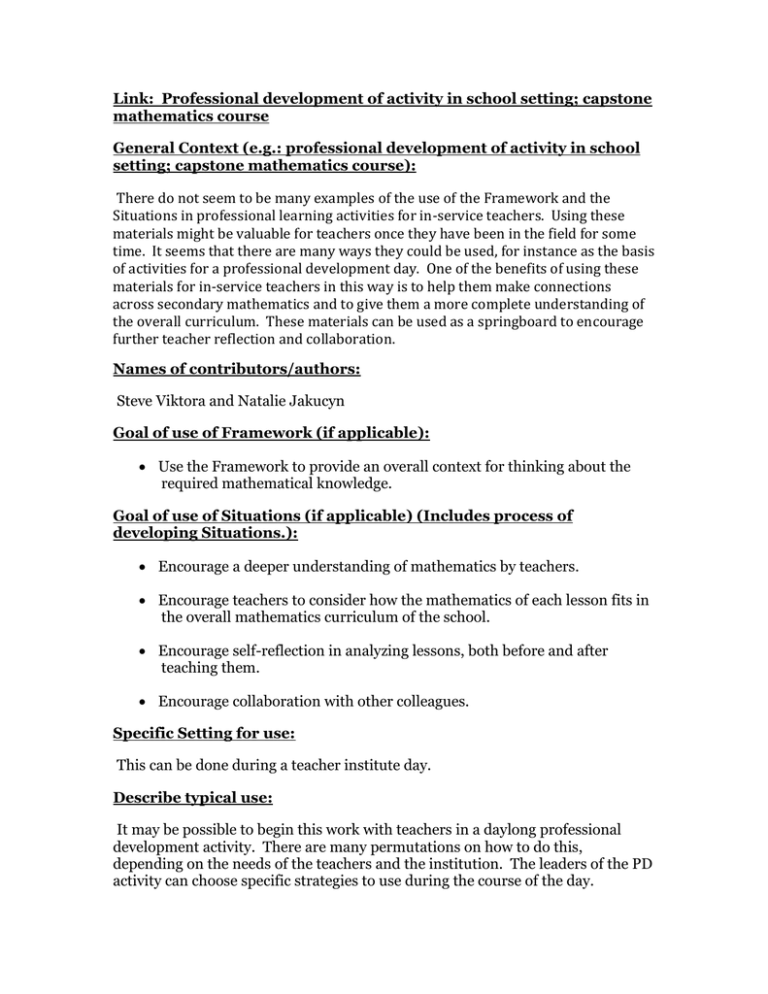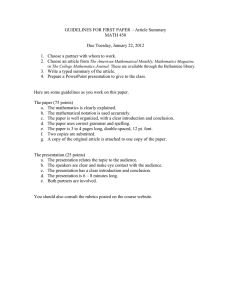Link: Professional development of activity in school setting; capstone
advertisement

Link: Professional development of activity in school setting; capstone mathematics course General Context (e.g.: professional development of activity in school setting; capstone mathematics course): There do not seem to be many examples of the use of the Framework and the Situations in professional learning activities for in-service teachers. Using these materials might be valuable for teachers once they have been in the field for some time. It seems that there are many ways they could be used, for instance as the basis of activities for a professional development day. One of the benefits of using these materials for in-service teachers in this way is to help them make connections across secondary mathematics and to give them a more complete understanding of the overall curriculum. These materials can be used as a springboard to encourage further teacher reflection and collaboration. Names of contributors/authors: Steve Viktora and Natalie Jakucyn Goal of use of Framework (if applicable): Use the Framework to provide an overall context for thinking about the required mathematical knowledge. Goal of use of Situations (if applicable) (Includes process of developing Situations.): Encourage a deeper understanding of mathematics by teachers. Encourage teachers to consider how the mathematics of each lesson fits in the overall mathematics curriculum of the school. Encourage self-reflection in analyzing lessons, both before and after teaching them. Encourage collaboration with other colleagues. Specific Setting for use: This can be done during a teacher institute day. Describe typical use: It may be possible to begin this work with teachers in a daylong professional development activity. There are many permutations on how to do this, depending on the needs of the teachers and the institution. The leaders of the PD activity can choose specific strategies to use during the course of the day. One way to do this would be to begin by presenting the prompt of an appropriate Situation and encourage the teachers to think about the mathematics involved not just in the specific situation but also in a larger context. This might be an uncomfortable activity, but it can provide time for the participants to be prepared for discussion. The foci of the Situation can be introduced and discussed, one at a time, followed by a conversation about how this activity can be helpful. At this point, it might be appropriate to introduce the Framework, giving teachers time to read the document. (Given the constraints teachers face, it is probably not realistic to assume that teachers will have read the document ahead of time.) As part of the effort to encourage understanding of the Framework, it is important to discuss how the Situations were used to develop the Framework. Later in the day, several other Situations can be used in a variety of ways. For instance, it might be valuable to group participants by course committees to analyze Situations appropriate to their courses. The day should end with an appropriate culminating activity that, hopefully, will encourage teachers to use these materials as a springboard to improving the mathematical quality of their lessons. Describe the mathematical goal(s) of the use: Help teachers make mathematical and curricular connections. Challenges in Implementation: Ideally one would like to have the teachers read the Framework in advance, the reality is that teachers are extremely busy, and it is likely that all (or many) of them would do so. Thus, it is important to allow sufficient time during staff development days to do what might be considered preparation (such as reading a document). There needs to be a correlation between the Framework and the Situations. Because it is not possible to expect to develop a situation for each content topic in the curriculum, the challenge is to develop teachers’ abilities to do the necessary analysis either alone or with other teachers. This work can best be done in a collaborative culture.



